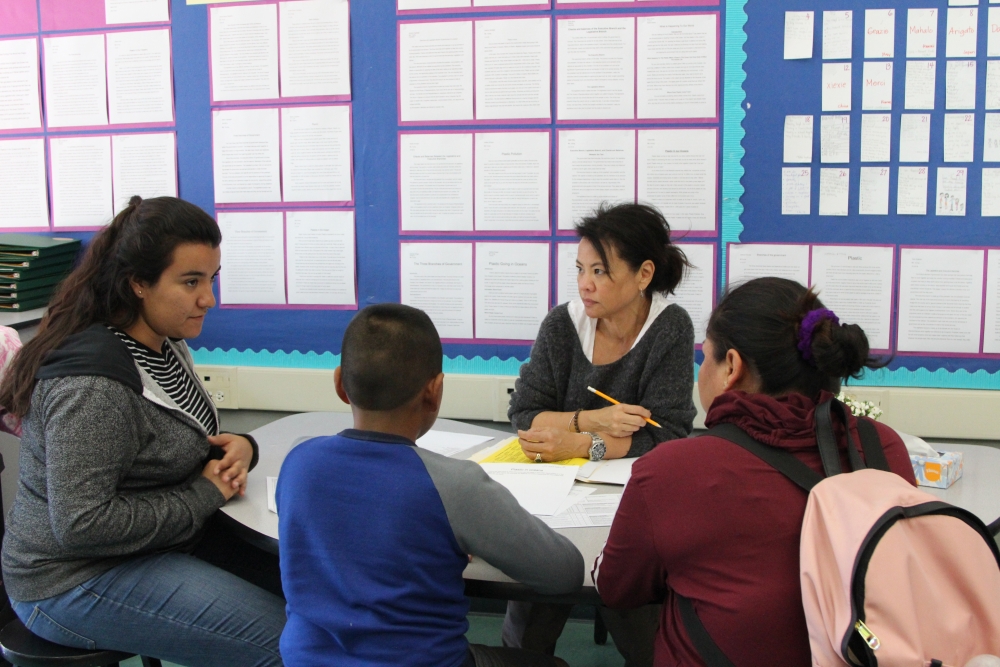
Elevating Voices
Parent-teacher conferences can be daunting even when you and your child’s teacher speak the same language. Imagine the additional challenge for non-native English-speaking parents trying to understand how their children are doing in school.
To help remove this language barrier, UC Santa Barbara’s Interdisciplinary Humanities Center (IHC) administers a program in which UC Santa Barbara students serve as paid interpreters during parent/guardian-teacher conferences at local elementary schools.
The program, called Interpreting in Our Local Schools, employs the trained student translators to attend twice-yearly conferences and school open houses to facilitate communication between teachers and parents. “Research has shown that the single most important factor in student success is parental involvement in their child’s education,” said Susan Derwin, director of the IHC. “For parents and guardians who do not speak English, this interpreter service enables them to communicate with their child’s teacher and, through this contact, engage directly in their child’s learning experience.”
The program also has immense value for the undergraduate and graduate students who participate, many of whom relate to the difficulties of navigating the American school system with parents who are not native English speakers. “For those students who are heritage speakers, the opportunity to meet a community in need often directly mirrors the support their families either received or, as is often the case, did not receive, when they themselves were K-12 students,” explained Derwin.
For interpreter Roberto Young, a second-year sociology major from San Jose, the program is an opportunity to use his bilingual proficiency to give back. “I decided to participate as a means to not only improve my bilingual interpreting skills, but also apply them in service to the surrounding Santa Barbara community,” he said. “I believe that the power of being bilingual cannot truly be achieved unless it is used to elevate the voices of marginalized communities.”
Young said he especially cherishes the opportunity to be the bearer of good news. “I enjoyed helping convey one young student’s increased reading and writing abilities in English, as well as his highly motivated character in the classroom,” he said. “It is always a privilege to pass along such positive feedback from teachers about the incredible progress of such resilient and intelligent students.”
Further, the program creates an important link between public school students, their families and the university, Derwin noted. “In interacting with these young adults who are heritage Spanish speakers, the parents meet college students who share the same or similar language and cultural background as their own children,” she said. “This shared knowledge set stimulates positive identification that makes the university more imaginable as a destination for their own children.”
Interpreting in Our Schools has so far provided translation for conferences at Isla Vista Elementary and Franklin Elementary, and Derwin hopes in the future to expand into more schools and serve more families. Though most of the participating UC Santa Barbara students provide Spanish language interpretation, the IHC also connects the Goleta Union School District with students who are fluent in other languages. “It is our hope that we will be able to keep a current list of students with language-brokering skills in many languages, including Spanish, Mandarin, Tagalog, Korean, Japanese and Vietnamese,” said Derwin.
Currently supported by a Rosati Grant from UC Santa Barbara’s Division of Humanities and Fine Arts, the program is seeking more funding to develop further what Derwin sees as a crucial aspect of publicly-engaged humanities.
“[Interpreting in Our Schools] relates to a key component of the IHC’s mission,” she said, “which is to mobilize the unique tools of the humanities to deepen our students’ participation in democratic society through cultural work that strengthens the communities of which we — the university as an institution, and our students, faculty and staff — are a part.”



